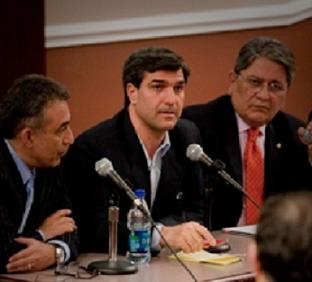March 13, 2011
Overlooked and Forgotten: Human Rights in Iran
گزارش كنفرانس دانشگاه smuبا حضور عليرضا نوري زاده ٬ علي اكبر موسوي خوئيني و Oscar Guevara Morales


لينك اول:
http://www.smudailycampus.com/polopoly_fs/1.2073779!/DC030711_web.pdf
لينك دوم:
http://www.smudailymustang.com/?tag=mora-namdar
لينك سوم:
http://www.smudailycampus.com/mobile/news/panelists-discuss-unrest-in-iran-1.2070332
The Future of Democracy and Human Rights in Iran
Location: Southern Methodist University, Time: 3:00 p.m
Participants: Ali Reza Nourizadeh, Mojtaba Vahedi, Oscar Morales, Aliakbar Moussavi Khoeni
Moderated by: Mora Namdar - Editor-in-Chief, National Security Law Brief of American University Washington College of Law
Sponsored by: SMU Amnesty International and SMU Embry Human Rights Department
NATIONAL SECURITY LAW BRIEF
Dr. Ali Reza Nourizadeh
The world renowned Iranian journalist
Senior commentator for Voice of America
Columnist for London Kayhan
Director of the Centre for Iranian & Arab Studies
Senior writer in Al-Sharqal Awsat Arabic daily news paper
Editor in chief of Al-Moujez monthly News letter in Arabic
Former editor of Etela'att
Former editor in chief of Weekly magazine Omid Iran
Mr. Mojataba Vahedi
Chief advisor to Mr. Kahrobi’s 2005 & 2009 election
Chief advisor to Mr. Kahrobi as speaker of the house (Majlis) in 2000
Former editor in chief of Aftabe Yazd which endorsed both reformist candidates (Mr. Mousavi and Mr. Karroubi) and criticized Ahmadinejad
Author of several of Mr. Karroubi’s letters including a well-known protest to Mr. Firouz-Abadi, the commander of the Armed Forces
Spokes person for Kahrobi
Ali Akbar Mousavi Khoeini
Notable Iranian human rights activist and politician
Current president of Advar Tahkim Vahdat
Elected as a Member of Parliament in the 6th Parliament of Iran working the defense of the rights of political prisoners during the 1990’s.
Founded Sazeman-e Danesh Amokhtegan-e Iran (Iran Students Alumni Organization) to defend human rights of students, women, prisoners, and minorities.
He was arrested in a protest on June 12, 2006 in Haft-e Tir Square in Tehran and was put in solitary confinement. He was released on bail on Oct 22, 2006.
Oscar Guevara Morales
First visiting fellow in the Human Freedom area of engagement at the George W. Bush Institute
Recently appointed the youngest Counselor of One Young World, an initiative supported by Kofi Annan, Archbishop Desmond Tutu, Sir Bob Geldof, Mohamed Yunus, and others.
Creator of the Facebook group "One Million Voices against FARC,“ led the WORLDWIDE MOBILIZATION AGAINST FARC that took place on February 4, 2008.
Cofounded the One Million Voices Foundation
In May 2009, Morales was a speaker at Google Zeitgeist 2009 in London
In September 2008, spoke at Facebook headquarters‘ invited by founder Mark Zuckerberg
Daily Campus > News
Panelists discuss unrest in Iran
By Melissa Maguire
Email: mmaguire@smu.edu
SPENCER EGGERS/The Daily Campus
Ali Akbar Moussavi Khoeni speaks at the “Future of Democracy and Human Rights in Iran” lecture Sunday afternoon in the Hughes Trigg Forum.
In a lecture sponsored by the Embrey Human Rights Department and the SMU chapter of Amnesty International, a panel of three celebrated human rights activists discussed the future of democracy and human rights in Iran.
The discussion was between Ali Reza Nourizadeh, a world-renowned Iranian journalist and political commentator Ali Akbar Moussavi Khoeni, a former member of the Sixth Parliament of Iran; and Oscar Guevara Morales, creator of the revolutionary Facebook group "One Million Voices Against FARC." The discussion was moderated by Mora Namdar, an SMU alumnus and current law student at the American University Washington College of Law.
The lecture opened with a comment by Namdar, who addressed the issue of human rights by saying, "It's not a left-wing issue and it's not a right-wing issue; it's a right thing issue."
Her opening remarks were followed by Nourizadeh's remarks describing the origin of the current instability in Iran.
"We wanted to burn down the house to build a new house, but what we built was a prison," he said.
He referred to the situation in Iran as one of political and civil unrest, which stems from the oppressive power of the regime of the Islamic Republic of Iran.
"In the regime, the torturers are praying and fasting…and committing these crimes in the name of the Almighty, Allah. You are a human being as long as you support the regime, fight for the regime, and are willing to die for the regime," Nourizadeh said.
Khoeni reinforced this statement.
He said that "you should have the right to question authority. Is it your civic duty and responsibility to ask questions and discuss. Transparency is the most important element in a democracy."
A common theme throughout the lecture was the suppressed power of the people to instigate change. Morales, whose 12-million-person-strong stand against the violent Colombian guerilla group, Revolutionary Forces of Colombia (FARC, when translated) garnered international attention, emphasized the importance of social networking sites and real-time communication.
"What internet resources allow us to do is have ‘citizen journalists,' people who are not experienced in news reporting, but who are actually out there with their phones and cameras, on the streets, where the action is happening. It is uncensored, unfiltered, and real-time," Morales said.
All three panelists agreed that a major step toward solving the issue of Iranian unrest is the mobilization of think-tanks, such as students, teachers, politicians, and activists through the use of honest and open information.
Nourizadeh said, "The people inside the country are not informed of the threat, and so they are complacent and complicit. You can ask anyone on the streets to name five crimes committed by the regime, and they will struggle to name maybe two."
Khoeni agrees, and supports Nourizadeh's claim.
"[Iran] needs the support of the international community. Priority should be given to human rights," he said.
All three leaders agreed that the common factors keeping people from speaking out are imminent discomfort, instilled fear and indifference.
The trio agrees that a non-violent revolution is necessary to topple a regime, but that such a revolution would require the full commitment and informed

